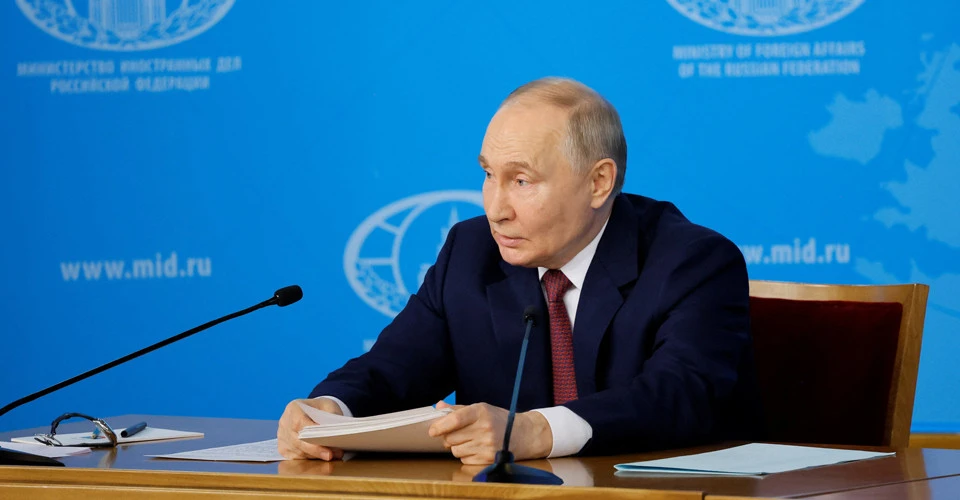
Kursk operation shattered 'war at a dead end' stereotype, created dilemmas for Putin — diplomat Khara
Oleksandr Khara, a diplomat and foreign policy expert at the Center for Defense Strategies, discussed the dilemmas the Kursk operation has created for Russian leader Vladimir Putin
He shared his insights on Espreso TV.
Khara highlighted the military aspect.
“The first dilemma is that to defend his territory, Putin needs forces and resources. He can pull them from eastern Ukraine, where the Russians, unfortunately, are advancing and making some tactical gains. But they aren't in a rush to move those forces and resources, not to the extent we'd hope. They’re now trying to recruit from other regions of Russia, throwing them straight into battle. There’s even talk of conscripts being used — they’re throwing everything they’ve got at us,” Khara remarked.
Khara also pointed out the political dilemma.
“The political issue is that if Putin is short on manpower, despite his million-strong army, he’ll need to address mobilization. This could be a hidden mobilization, luring people from 400,000 to 2 million into his killing machine, or a general mobilization. A general call-up would be a blow to Putin's prestige and would stir unrest among the Russian populace, especially when it’s not just the marginalized or ethnic minorities being sent to fight, but people from St. Petersburg, Moscow — social tensions will rise,” he said.
Additionally, Khara noted the economic dilemma.
“Then there’s the economic angle. The head of Russia’s central bank recently painted a pretty grim picture of the Russian economy — not as dire as we'd like, but still. One key issue was the labor shortage. If more people are sent to fight, it will strain factories — whether military or civilian — which means an even greater burden on an already struggling Russian economy, despite all the bravado about GDP growth outpacing Germany or other countries.”
Khara also addressed the territorial dilemma:
“And of course, there’s the territorial issue. The idea of ‘fixing the situation on the ground’ won’t fly for Russia — it would mean legally recognizing Russian territory that they’d rather not. They'll have to come up with other solutions. But there’s already a political victory in this operation. Whether the military side succeeds, we’ve shattered the myth that the war is at a dead end. We’ve shown that we can gather the forces and resources to carry out a military operation on Russian soil, professionally and rather beautifully,” the expert concluded.
Ukraine’s cross-border incursion in Russia’s Kursk region
On August 6, the authorities of Russia's Kursk region stated that the Ukrainian Armed Forces allegedly tried to break through the Russian border, but were pushed back. Later, the Russian Defense Ministry reported that "the Ukrainian sabotage and reconnaissance group retreated to its territory.”
On August 7, Kremlin leader Vladimir Putin convened the Russian military leadership to discuss the situation in the Kursk region, which he called a "large-scale provocation." At the time, Russian Foreign Ministry spokeswoman Maria Zakharova called on the international community to "strongly condemn the Kyiv regime's criminal attacks on Russian territory."
On August 10, President Zelenskyy called the operation in the Kursk region “pushing the war into the aggressor's territory.” At night of the same day, the authorities introduced a counterterrorism operation in the Bryansk, Kursk, and Belgorod regions of Russia.
On August 14, it became known that the Ukrainian military had formed a “sanitary (buffer) zone” for self-defense in the Kursk region of Russia. It is planned to open humanitarian corridors for the evacuation of civilians, and if necessary, military commandant's offices will be established in the Russian region.
At a meeting with the president on August 15, Ukrainian Armed Forces Commander-in-Chief Oleksandr Syrskyi said that Ukraine had established the first military commandant's office in the Kursk region to provide humanitarian aid to local residents.
At the same time, Ukraine's Ministry of Reintegration of the Temporarily Occupied Territories, together with the military, is currently working on a possible route for a humanitarian corridor for civilians from Kursk to Sumy.
On August 15, The Independent reported that about 2,000 Russian servicemen were captured during an operation by the Ukrainian Armed Forces in the Kursk region.
On Friday, August 16, a bridge over the Seim River in the Glushkovsky district of the Kursk region was destroyed.
That same day, the Ukrainian military released rare footage showing the first hours of their offensive operation in the Kursk region.
Finally, on August 17, military journalist Andriy Tsaplienko reported that Ukrainian forces had entered the village of Korenevo in the Kursk region.
- News











































